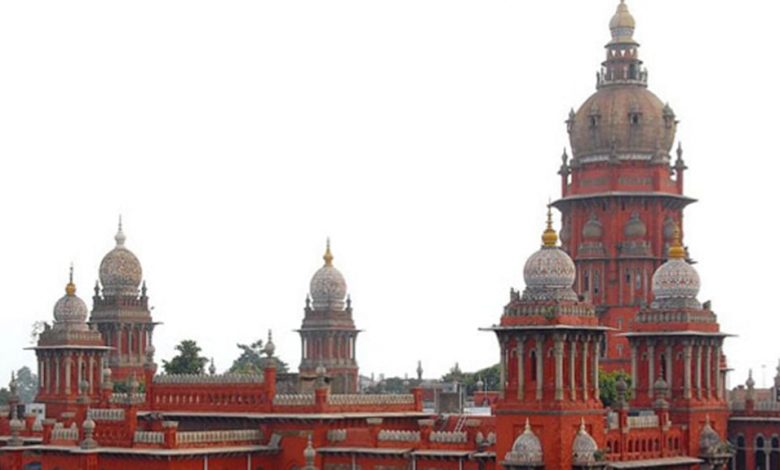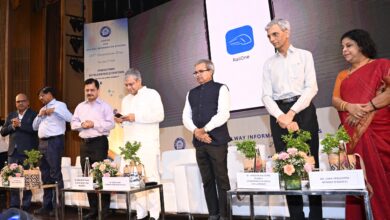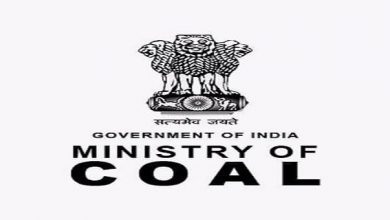Four PILs Challenging Amalgamation of 6 PSBs To Come Up For Hearing in Madras High Court on November 26

R.P. Ilango Yadav, the General Secretary of Syndicate Bank OBC Employees Sangham has filed four Public Interest Litigations as party in person, challenging the amalgamation of Public sector Banks including amalgamation of SBI and SBI subsidiaries. The petitions came up for hearing before the bench, before the Lordship Hon’ble Chief Justice of Madras High Court Sri Amreshwar Pratap Sahi and Hon’ble Justice Sri Senthilkumar Ramamoorthy on October 28 and after hearing arguments of both sides, the Court fixed November 26 as the next date of hearing.
The first writ petition 14151/2020, 14155/2020 & 14159/2020 challenged the amalgamation of 6 PSBs with 4 PSBs, SBI subsidiaries Banks with SBI, and Vijaya Bank and Dena Bank with Bank of Baroda. The petitioner allege that about 27 years ago, the New Bank of India (NBI), then Public sector Bank since 1980 was amalgamated with Punjab National Bank (PNB) in the year 1996, only when the NBI was sick under moratorium, RBI as per section 9(1) of the Banking Company( Acquisition & Transfer of undertaking) 1970/1980 submitted the amalgamation scheme and as per section 9(6) of the Acquisition Act, the government place the amalgamation scheme in the parliament and only after the parliament approve the amalgamation scheme, the NBI was amalgamated with PNB in the year 1993. Only if a PSB is sick under moratorium, the RBI as per its guidelines can use amalgamation tool. Since all PSBs now amalgamated are with sound capital and well performing Banks, so the petitioner allege that RBI has no authority to use amalgamation tool, and so the central government has not placed any amalgamation scheme in the parliament, whereas, without parliament approval no amalgamation scheme will be implemented as per Acquisition Act and as per HSC judgement in New Bank of India employee Union Vs Union of India. Yet by way of gazette notification No 133 dated 04.03.2020, the Finance ministry, in spite of the reasons that all the PSBs now amalgamated has sound capital and well performing PSBs, yet, amalgamated 6 PSBs were amalgamated with 4 PSBs w e f 01.04.2020, Vijaya Bank and Dena Bank were amalgamated with Bank of Baroda w e f 01.04.2019 and all subsidiaries Bank of SBI was amalgamated with SBI w e f 01.04.2017, thus illegal.
Further petitioner alleged that as per Payment and Settlement Act 2007 only banks in the 2nd cshudule of RBI alone can be entitle to participate in the “Electronic funds transfer”, though Vijaya Bank and Dena Bank were removed from 2nd schedule as per RBI notification dated 28.11.2019 yet till date, the RBI is allowing them to participate in electronic funds transfer is illegal, that merging better performing Banks with less performing Bank is not necessary, not essential and goes against public interest as per Hon’ble Supreme Court judgement; that SBI closed 2018 branches and overall all PSBs closed 3766 branches, many employment is lost that directly affect the downtrodden entry into PSBs by way of reservation; that at the cost of PSBs branches closed, a favorable situation was created for private Banks which opened about 3 times the PSBs branches closed goes against the Hon’ble Supreme Court judgement; that the FM official statement that the necessity to amalgamate in order to increase to give more credit is not essential as if the single borrower credit exceeds certain limit, then the only way out is to share the credit by way of consortium advances; that the amalgamation to support larger ticket lending goes against public interest as per RBI report placed in parliament has categorically said that stress on larger borrower has been on the rise in PSBs; that PSBs to work on commercial consideration as per the cabinet decision dated 23.08.2017 will go against the objective of Acquisition Act 1970/1980, that Private Banks were nationalized in the year 1970/1980 only to work on public interest, to work for public welfare and to work as per Constitution of India 39(b) and (c) that to distribute the economy to public and to prevent concentration of economy; that amalgamation caused lot of discrimination among the workforce of merged banks with that of anchor Banks; that out of 16 PSBs only 6 PSBs were picked for amalgamation and 6 PSBs were not picked up for amalgamation is discrimination; that before amalgamation the PSBs were every year opening many branches that after amalgamation they started closing branches goes against public interest as per HSC; that after amalgamation the merged banks would become next-gen bank is devoid of facts that after amalgamation both SBI and BOB started incurring losses, that the top post as per the RTI information continued to be occupied by people other than SC/ST/OBCs, that caste and surname seen placing a major role to pick people for the top post, that the petitioner submitted that though no doubt people other than SC/ST/OBCs are competent, yet the petitioner contented that SC/ST/OBCs are also competent and they are not bankrupt of competency from the grate vault of about 82% of Indian population, hence the petitioner pray to give chances for SC/ST/OBCs also to hold for the top post and prayed to direct the government to constitute a professional body to professional assess the competency irrespective of castes and surnames.
Further, vide writ petition No 14160/2020 the petitioner challenged the validity of amalgamation, that as per competition commission act 2002, vide section 54(a) the central government can exempt only sick PBSs under moratorium from the preview of competition commission whereas the central government by way of gazette notification dated 30.08.2017 exempted sound capital well performing PSBs from the preview of competition commission is illegal and not permitted as per section 54(a). Further for SBI the central government has not issued any gazette notification exempted SBI from the preview of competition commission nor SBI has applied for competition commission permission, thus on this ground the amalgamation of SBI and its subsidiaries is thus illegal.




